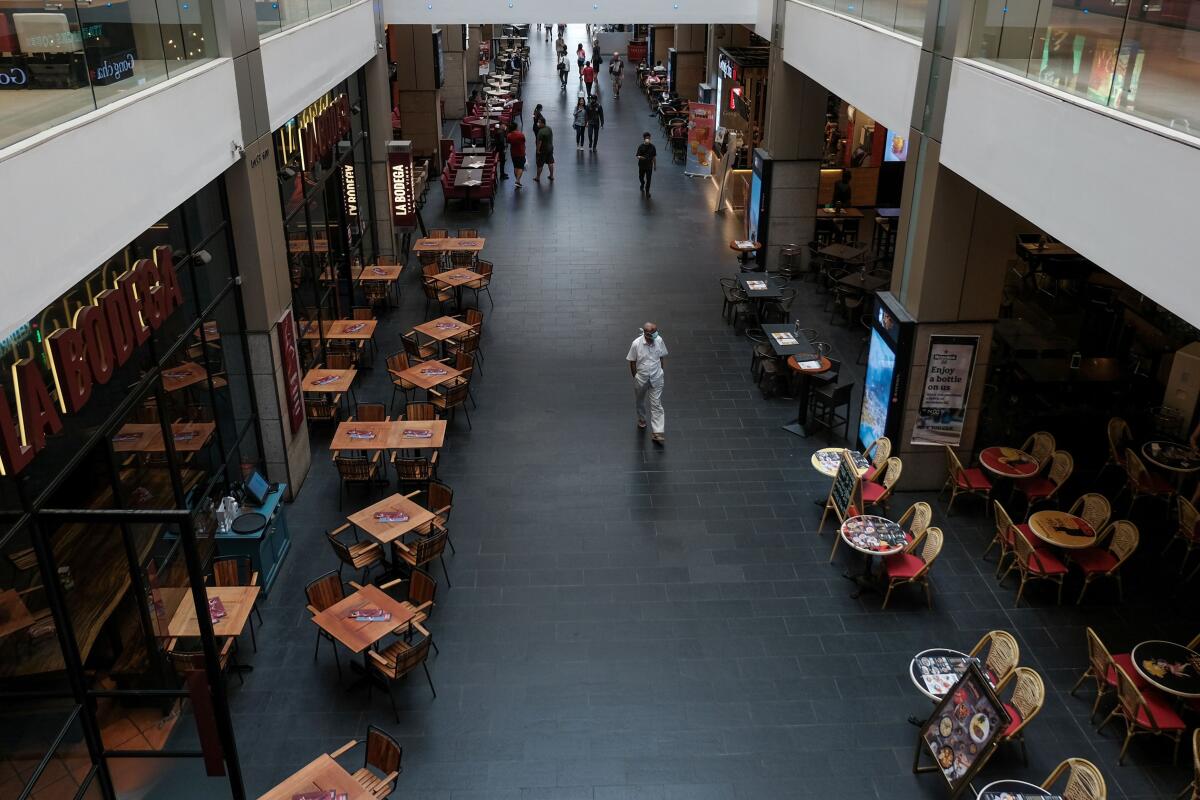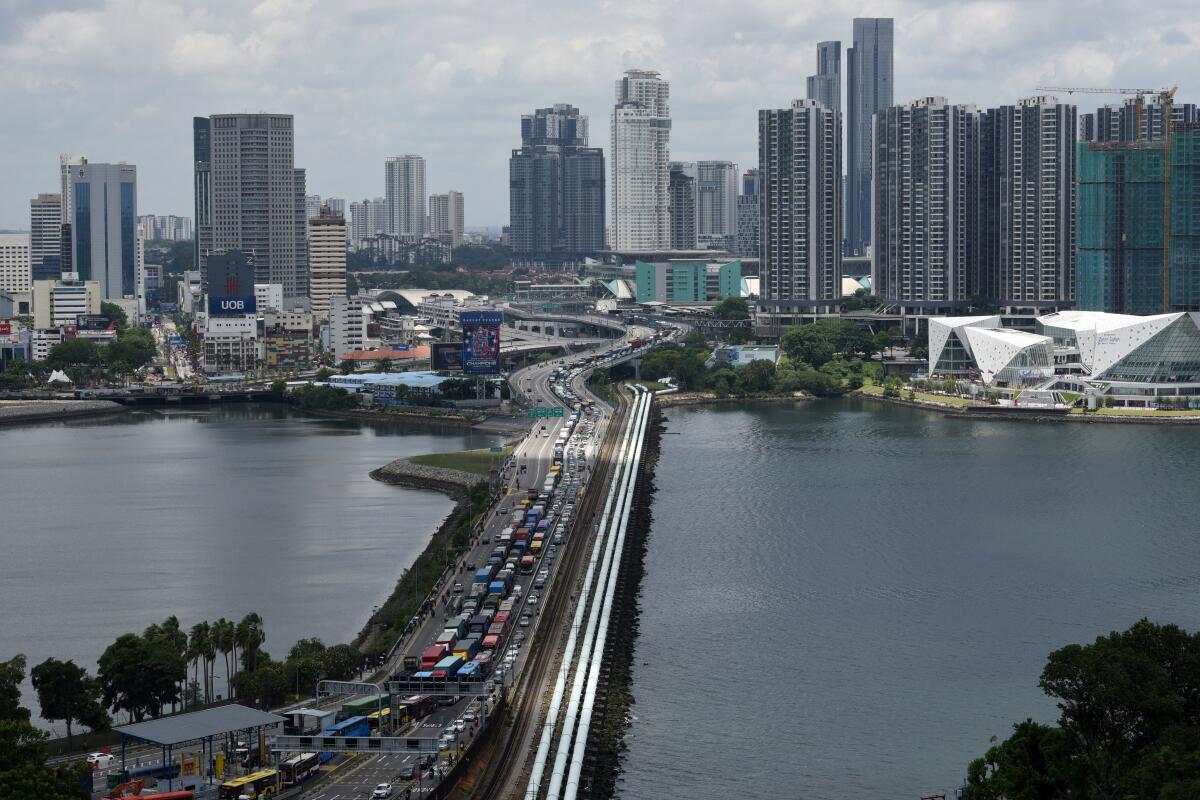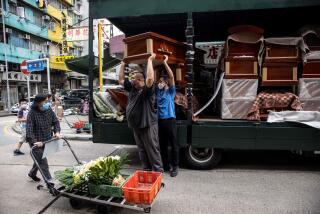Coronavirus surging in Southeast Asia, with new cases traced to religious gathering

- Share via
SINGAPORE — At the end of last month, thousands of Muslim missionaries from two dozen countries congregated at a sprawling mosque complex outside the Malaysian capital for a weekend of prayer.
Now authorities in multiple countries are searching for people who attended the event, a key driver of a surge in coronavirus cases across Southeast Asia that has prompted sweeping new travel restrictions and social distancing measures.
Malaysian health officials said Tuesday that they had traced more than 400 infections — and one death — to the four-day gathering at the Seri Petaling mosque outside Kuala Lumpur from Feb. 27 to March 1. The gathering by Tablighi Jamaat, a conservative missionary movement, is the source of more than half of the country’s nearly 700 recorded cases of COVID-19, the most in Southeast Asia.
Experts worry that many more infections could still emerge: As of Monday respiratory samples had been collected from fewer than one-quarter of the roughly 14,500 Malaysians who attended the event. Almost 6,000 people were yet to be located.
Another 1,500 attendees came from overseas. Five countries — Singapore, Thailand, Cambodia, Indonesia and Brunei — have identified coronavirus infections in citizens who attended the gathering.
The Tablighi Jamaat event, held before Muslim-majority Malaysia had announced any significant social distancing measures, has accelerated a second wave of infections across a closely connected Southeast Asian region that until now has managed to keep a lid on the epidemic.
Mosque leaders at first resisted the idea that the gathering was connected to the spread of the virus, with one official quoted as saying he didn’t want the institution’s name “tied to all sorts of perceptions.” Health officials also said for days that 5,000 Malaysians had attended the event, before raising the latest estimate to nearly three times that number.
At the time, “Malaysians were still in a state of relative complacency about the need for social distancing,” said Khor Swee Kheng, a Malaysian physician and public health specialist.
No longer: Malaysia announced on Monday that it was closing its borders for two weeks, barring its citizens from traveling abroad and shuttering all religious institutions, government offices, schools and businesses. Organizers of the missionary gathering this week urged attendees to get screened.
Prime Minister Muhyiddini Yassin said “drastic moves” were needed to stop the virus’ spread.
The decision is expected to have immediate repercussions in neighboring Singapore, the wealthy city-state where hundreds of thousands of Malaysians work, many commuting across the border daily.

Singapore, which has won praise for managing its outbreak while avoiding the large-scale shutdowns seen in the U.S. and elsewhere, has recorded an uptick in cases in recent days. Most of the new infections are in residents who are believed to have been exposed to the virus while overseas, including at least five who were at the mosque event in Malaysia.
After Singaporean authorities traced the movements of the five infected people and found they had visited at least 10 mosques after they returned, the country’s Islamic Religious Council said it would suspend activities at all mosques for two weeks.
The Singaporean government this week ordered travelers returning from other Southeast Asian countries to isolate themselves at home for 14 days. Malaysia was exempted from the order due to the close economic ties between the countries, but officials said this week that they had not ruled out stricter measures.
“The increasing number of cases from the religious meeting in Malaysia is a concern, but the control strategy remains the same,” said Ooi Eng Eong, deputy director of the emerging infectious diseases program at Duke-NUS Medical School in Singapore.
“We will not be able to undo the transmission that has happened, but we can minimize the likelihood of new chains of transmission from forming.”
The mosque event went relatively unnoticed until March 9, when a 53-year-old man tested positive for the coronavirus in his home country of Brunei. Authorities there said he had returned from Kuala Lumpur on March 3 and begun showing symptoms four days later — the first coronavirus case in the small, oil-rich nation on the island of Borneo.
By Tuesday, Brunei had recorded 54 cases, most linked to the Malaysian gathering.
Cambodia said that of 33 people infected, 22 had attended the mosque event.
Officials in Thailand said that two Thais who attended the event had tested positive for the coronavirus, but they were still searching for some of the 132 Thai participants. Provincial religious affairs committees have been urged to help locate attendees and get them to report to health authorities.
The spike in cases has spread worry across a region of tightly packed urban areas and limited medical infrastructure. As one of the more economically developed countries in Southeast Asia, Malaysia is seen to have better testing capacity than its regional neighbors.
“It is inevitable that the number of cases in Malaysia will continue to rise,” Khor said. “However, with the range of movement restrictions announced by the government, complacency in Malaysian society could be broken, leading everyone to take the outbreak more seriously and adopt social distancing measures.”
More to Read
Sign up for Essential California
The most important California stories and recommendations in your inbox every morning.
You may occasionally receive promotional content from the Los Angeles Times.











